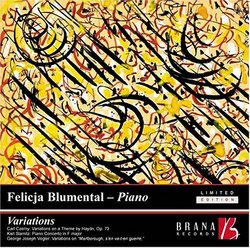| All Artists: Carl Czerny, George Joseph Vogler, Karl Stamitz, Alberto Zedda, Jörg Faerber, Helmut Froschauer, Prague New Chamber Orchestra, Wüttemberg Chamber Orchestra, Vienna Chamber Orchestra, Felicja Blumental Title: Variations Members Wishing: 0 Total Copies: 0 Label: Brana Records Release Date: 10/10/2004 Genre: Classical Styles: Forms & Genres, Concertos Number of Discs: 1 SwapaCD Credits: 1 UPCs: 803680439555, 821158102428 |
Search - Carl Czerny, George Joseph Vogler, Karl Stamitz :: Variations
 | Carl Czerny, George Joseph Vogler, Karl Stamitz Variations Genre: Classical
Carl Czerny wrote several pieces based on national anthems, folks songs and other well-known songs. Here, the 1797 hymn by Joseph Haydn, ?Gott erhalte den Kaiser? (God Protect our Emperor) is Czerny?s subject. Later, it be... more » |
Larger Image |
CD DetailsSynopsis
Album Description Carl Czerny wrote several pieces based on national anthems, folks songs and other well-known songs. Here, the 1797 hymn by Joseph Haydn, ?Gott erhalte den Kaiser? (God Protect our Emperor) is Czerny?s subject. Later, it became known as ?Deutschland über Alles.? The work is a perfect example of Czerny?s art of orchestration, a technique he developed through copying the parts of Bach?s fugues, Scarlatti?s sonatas and works by Haydn, Mozart and of course, his teacher Beethoven. The animated finale is clearly influenced by Beethoven. This is hardly surprising, as Czerny was said to have committed all Beethoven?s piano compositions to memory. The Piano Concerto in F major is the only surviving keyboard concerto by Karl Stamitz and is often not listed in his repertoire. Stamitz favoured the 3-movement Italian pattern (fast-slow-fast) in his orchestral works and the Rondo (which was very popular in France at the time), both of which feature in this work. Unlike many of his contemporaries, who remained in and adhered to conventions of the court, Stamitz travelled widely. His compositions were subsequently influenced by his experiences and the counties he visited. This is true of the Piano Concerto in F major. It is not surprisingly that he used exotic melodies in his compositions having visited such countries with dramatic musical tastes. Like Stamitz, Vogler travelled around Europe although his tours took him to further afield to unusual countries such as Gibraltar, Greece (under the Ottoman rule), North Africa and Greenland. Curiously, Vogler was an inventor of instrumental devices and an experimenter in acoustics. The instrumentation could be considered experimental here, where Vogler writes for piano solo, two flutes, two bassoons, two horns and strings. Vogler was also admired for his improvisation so composed 11 variations may have been an easy task for the composer. Variations on L?air de "Marlborough, s?en va-t-en guerre (1791)," is based on an 18th Century nursery song title, ?Malbrouk, s?en va-t?en Guerre.? It is assumed that Marlbrouk should have been Marlbourgh (a reference to the Duke). The melody is now more familiarly known as ?For He?s a Jolly Good Fellow?"! and ?We Won?t Go Home ?til Morning.? Similar CDs
|
CD ReviewsMUSIC LOVER Alan R. Omer | Dripping Springs, Tx | 07/20/2007 (5 out of 5 stars) "Carl Czerny is a composer who took lessons from Beethoven and in turn gave lessons to Lizst. His compositions are largely forgotten and rarely recorded or performed. I bought this CD strictly for the Czerny piece. I heard a recording of it about 13 years ago on the local classical radio station and searched the local record stores for it and was told it wasn't available. I was very pleased to purchase the CD through Amazon dot com earlier this year. The Haydn Variations was a much requested piece when the local classical radio station took requests on their listeners choice night. At the time I first heard the piece the local station had a recording on an old out of print LP. A manager of one of the local record stores told me always got calls from customers searching for the recording every time the station played it. The piece is not well known and academics would probably turn their nose up at it but I found it very enjoyable and found the late pianist, Felicja Blumental, to be a fine advocate of the piece. I don't believe any other recordings of the piece are currently on the market. The piece is a set of variations on the slow movement from Haydn's Op 76 Kaiser String Quartet. I am not a musician so I can't comment on the technical aspects of the playing and the recorded sound is only average due to the age of the recording. I give the recording 5 stars based on my fondness for the piece and the fact that it is the only recording available for the Haydn Variations." A delightful discovery Renato Polo | Milano, Italy | 02/21/2010 (4 out of 5 stars) "Czerny's variations on F.J.Haydn's Keiser theme "God bless our Emperor" magnify with piano virtuosity the well known anthem whose words were unfortunately modified during the nazi period.
Stamitz piano concert and Vogler Variations provide valid support to this recording." |

 Track Listings (25) - Disc #1
Track Listings (25) - Disc #1